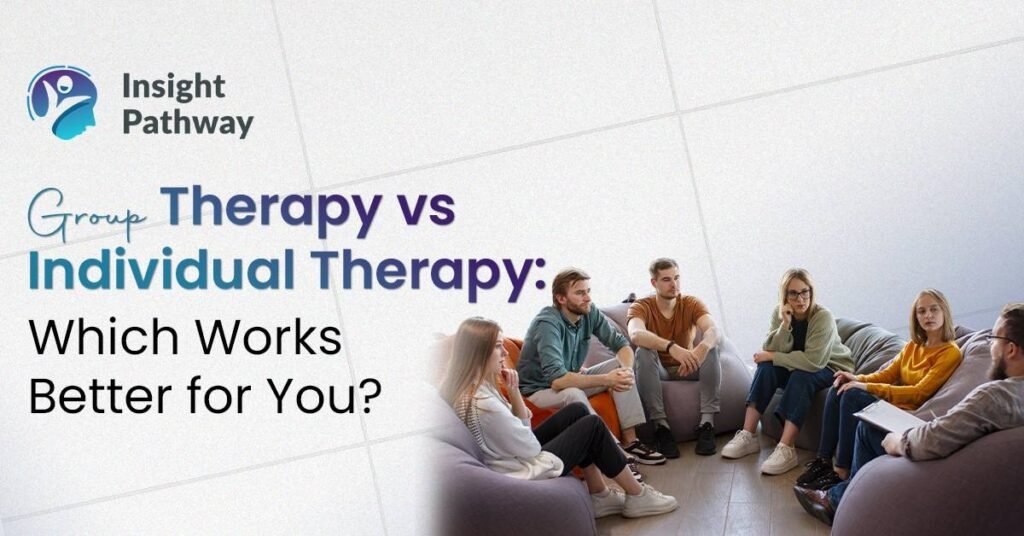When seeking counselling, one of the first questions people face is: Should I choose group therapy or individual therapy? Both approaches have unique strengths, and the right option often depends on personal needs, goals, and preferences. Understanding the differences between group therapy vs individual therapy can help you make an informed decision about your healing journey.
In this blog, we’ll break down the benefits of both approaches, explore their differences, and help you decide which therapy option may be the best fit for you.

What Is the Difference Between Group Therapy and Individual Therapy?
Group therapy involves a small group of participants, typically led by one or more licensed therapists. Members share experiences, offer support, and learn from one another in a structured environment.
Individual therapy, on the other hand, is a one-on-one session between a therapist and a client. It allows for personalized attention and tailored treatment plans.
Both therapy options aim to support mental health recovery, but the dynamics, benefits, and challenges differ.
What Are the Benefits of Group Therapy?
Group therapy offers unique advantages that cannot be replicated in one-on-one settings:
- Shared experiences: Hearing others’ stories creates a sense of belonging and reduces isolation.
- Peer learning: Members learn coping strategies directly from others going through similar struggles.
- Community support: The group becomes a safe network where healing and encouragement thrive.
- Cost-effective: Group sessions are often more affordable than individual counselling.
For trauma counselling and conditions like anxiety or depression, the benefits of group therapy can be especially powerful because survivors realize they are not alone.
What Are the Benefits of Individual Therapy?
For many people, the privacy of individual therapy is essential. Key benefits include:
- Personalized treatment: The therapist tailors every session to your specific history and goals.
- Confidentiality: Conversations remain private, encouraging open exploration of sensitive issues.
- Deeper exploration: Individual sessions allow more time to address complex trauma or mental health concerns.
- Flexibility: Sessions can be adapted quickly to focus on urgent issues.
The benefits of individual therapy make it ideal for people who need focused, in-depth work on personal challenges.
Group Therapy vs Individual Therapy: Which Works Better for Trauma?
When it comes to trauma counselling, both methods have distinct roles.
- Group therapy helps trauma survivors break through isolation and find comfort in shared stories. Collective healing reduces shame and fosters resilience.
- Individual therapy provides a safe, controlled environment to process deeply personal or painful experiences without fear of judgment.
For many survivors, the best approach is a combination: starting with one-on-one counselling to build safety, then transitioning into group therapy for community healing.
How Do You Know Which Therapy Is Better for You?
The decision often depends on your goals and personality. Ask yourself:
- Do I feel comfortable sharing with others, or do I prefer privacy?
- Am I seeking connection and belonging, or focused personal growth?
- Do I need affordability, or am I investing in intensive counselling?
Neither option is universally “better.” Instead, the choice between group therapy vs individual therapy comes down to what feels right for your stage of healing.
Common Myths About Therapy Options
- “Group therapy is less effective.” In reality, research shows it can be just as impactful as individual sessions, especially for trauma and anxiety.
- “Individual therapy is only for severe problems.” Many people use one-on-one therapy for stress, life transitions, or personal development.
- “You must choose one or the other.” In truth, many people benefit from a blend of both approaches.
Debunking these myths makes it easier to choose the therapy option that truly supports mental health recovery.
Practical Tips for Choosing Between Group and Individual Therapy
If you’re unsure, consider these steps:
- Consult a professional. A therapist can assess your needs and recommend the best counselling approach.
- Try both. Many clinics offer trial sessions in group and individual formats.
- Evaluate your comfort. Notice where you feel most supported and motivated to heal.
- Stay flexible. Your needs may change over time, therapy choices are not permanent.
Can You Combine Group and Individual Therapy?
Absolutely. Many people find that combining the benefits of group therapy with the benefits of individual therapy creates the most balanced healing journey.
For example, individual sessions allow you to process trauma in depth, while group sessions provide community healing and accountability. This blended approach is often recommended in trauma counselling and other long-term recovery programs.
Final Thoughts: Finding the Therapy That Fits You
Choosing between group therapy vs individual therapy is a deeply personal decision. Both offer powerful benefits, whether it’s the privacy of one-on-one sessions or the shared strength of a group.
Remember: there is no single “right” choice. The best therapy is the one that feels supportive, safe, and aligned with your healing goals. Whether you begin in a group, in private, or combine both, the most important step is simply starting your journey toward mental health recovery.


